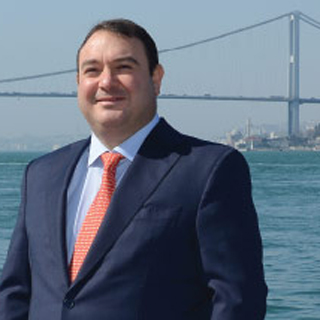An Able Navigator

Demir Sabanci, MBA ’99, President, chairman, and founder, Sedes Holding, and president and CEO of Sedesco Inc

Two pieces of art dominate the main boardroom at Sedes Holding, Demir Sabanci’s Istanbul-based investment management firm. One is an oil painting of a ship swaying through choppy waters. The other is a scale model of the Titanic. Both, Sabanci says, carry a message.
“They are little symbols I put together to remind our executive board that some things are going to go wrong,” he says. “We need to be prepared.”
Sabanci is no stranger to stormy weather. For the past few decades, Turkey has been an exciting, developing market, attracting foreign investors and building its own industry. But the country has also witnessed numerous crises, whether natural disasters, economic declines, or political upheaval. Each victory and hurdle has helped shape Sabanci’s outlook as an entrepreneur.
In 1999, the year Sabanci graduated from Johnson, a massive earthquake shook western Turkey. His family firm, Sabanci Holding, owned a company that sold generators and construction machinery and began sending equipment to the hardest hit areas. Foresight and public-mindedness have since been key to Sabanci’s own business style.
“We’ve seen four or five crises in Turkey in our time working together,” says Irem TÜzÜnalper, CEO of Turkish credit card and loyalty company EXTRA, and a longtime collaborator. “Throughout it, Demir has learned the value of each and every single customer.”
Business sense runs in the family. Demir Sabanci’s grandfather, the late Haci Ömer Sabanci, founded one of the largest business conglomerates in Turkey back in the 1940s. Growing up, Sabanci’s father Özdemir showed his son all sides of the family business. “I knew what the night shift was,” Sabanci says. “I knew how to make a quality product, what labor relations meant.”
Among the many projects spearheaded by his father was Hayat, Turkey’s first bottled water company. Sabanci remembers it for being practical, responding to an obvious need. “Back then, drinkable water was hard to find,” Sabanci says. “In restaurants the water always had particles in it. At home, we had to boil the water and add chemicals so we wouldn’t get sick.”
Still, there were risks involved. By introducing the first plastic PET bottles into the Turkish marketplace, Özdemir faced new environmental challenges. And the product was untested among the Turkish public. But Hayat grew into a huge success and remains an industry leader in Turkey.
Özdemir’s ability to test and challenge the Turkish consumer inspired Sabanci. So did his father’s emphasis on preparedness; Özdemir had himself made it through numerous crises.
Taking calculated risks would become one of Sabanci’s core philosophies. “I learned the importance of reliability and how to stay disciplined when outside shocks — a devaluation in the economy, a strike, a military takeover — occur,” he says. “My father always said, ‘We are farmers, not hunters.'”
Growing up, Sabanci attended a private American school in Tarsus, a small, historic Turkish city near the Mediterranean Sea. There, he got a first-class education but lived, he says, in a cultural “aquarium,” cut off from the complications in the rest of the world. He remembers the frustrations of sending college applications from Tarsus, worrying that the faulty Turkish mail system would prevent him from being accepted at his top choices. “Things back then were influenced by luck,” he jokes. “I didn’t know whether my applications would drop out of the mailman’s car or make it in time before the deadline.”
At Boston University, Sabanci studied economics and international relations and relished life in a big city. He took a class on Japanese business and management styles — “In the late ’80s and early ’90s, Japan was a big thing,” he says — and he was hooked.
In 1993, when he graduated, Sabanci got an opportunity to apply his knowledge of Japan. Özdemir had just entered into a joint venture with Toyota, and Sabanci asked to be involved. “I could have returned to Turkey and joined the family business,” he says. “But what better place to learn about management than Toyota of Japan in the early nineties?”
During those three years in Japan, Sabanci’s life changed dramatically. While there, he witnessed his first significant earthquake, in Kobe, and watched as his family’s company rushed to treat those affected at a Toyota-owned hospital normally reserved for victims of car crashes. In 1996, his father died suddenly, pulling him back to Turkey and to the family business. These events “opened my eyes to the volatility that we are subject to,” he says.
But it was back in Turkey, on the board of his family company, that Sabanci found his voice as a businessman. In terms of its demographics, Turkey is a very young country — half the population is under thirty years old — and this fact guided his ventures. “There is definitely an emerging middle class theme in this country,” he says. “For investments, you want to look at what will appeal to these young people who will get married and create homes over the next two to three decades.”
By focusing on the youth demographic, “Demir had the foresight,” says MÜsfik Cantekinler, a partner at Ernst & Young who works with Sedes Holding. “He understands what consumers want.”
In 1999, three years after returning to Turkey, Sabanci, along with Bahadir Özbek and other professionals at his family firm, established TeknoSA, a consumer electronics business. Demir served as president and chairman from its inception through the difficult first four years. It was a daunting task, with long lead times between the purchasing of goods from abroad and the sale of those goods in Turkey. But Sabanci was convinced that a combination of globalization, a strong youth demographic, and increasing wealth would make Turks flock to TeknoSA. He was right.
“Ten years down the road, that company became the dominant player in the market,” he says. “There was a one to ten return. It was really a success story.”
Özbek attributes the success of TeknoSA to Sabanci’s knowledge, curiosity, and hands-on approach to business. “He’s unique, an opinion leader,” Özbek says. “He reads and travels a lot. He’s a very hard worker.”
Cantekinler echoed this praise. “Many entrepreneurs don’t plan enough,” he says. “Maybe because of Demir’s education and his personal attachment to business, he comes up with a lot of plans — logistical systems, warehouse systems, integrated IT systems.”
Sabanci makes a point of being a part of the process and available to his staff. These qualities sometimes surprise his employees, but his unconventional approach helps to streamline projects. “Demir is a hands-on boss,” Cantekinler says. “I’ve seen him go through every page, marking it up. He asks many questions so he understands everything right down to the last detail.”
By the time Sabanci sold his shares in the family business and ventured out alone to found Sedes Holding, TeknoSA was generating sales in excess of 300 million dollars, with close to five percent net income. More impressively, it had survived 2001, when political upheaval triggered one of the worst economic collapses in recent Turkish history. “After the 2001 crisis, the company doubled in size every year,” Sabanci says. “At the end of 2004, I was leaving my family’s business with peace of mind.”
Sedes Holding, which Sabanci founded in 2004, has investments in plastics and aviation, among other sectors, as well as real estate investments in Turkey and New York City. But Sabanci is most excited by Gratis, a cosmetics retail chain he launched along with Özbek in 2009. Gratis, like TeknoSA, is aimed at Turkey’s young middle class, offering cosmetics at a lower cost than international chains. It also has a social mandate, providing jobs to women across the country.
Of the 2,000 Gratis employees, 99 percent are women. Sabanci is particularly focused on attracting employees in conservative parts of Turkey, where women might normally not seek work outside the home. Turkey continues to struggle with women’s rights issues, and by reaching out through Gratis, Sabanci feels he can contribute to the solution. “It’s not easy to hire all women,” Özbek said. “In Turkey, men are more eager to work, and it limits the employee pool.” But, in the end, “It’s the right decision.”
TÜzÜnalper, herself a high-powered woman in the Turkish workforce, admires the decision. “Today there are many challenges for women,” she says. “It’s good for the company to encourage women to be more active.”
Sabanci and Özbek are sensitive to the family and gender dynamics that might prevent women from working and try to respond accordingly at Gratis. They offer maternity leave and childcare options that exceed requirements by the Turkish state, as well as on-the-job training that allows women to advance into management positions. “It can be a burden for some firms to employ women,” Sabanci says. “We have the luxury of choice. We can choose to employ men and dilute that 99 percent. But we continue to hire only women because we think that it’s the right thing, not only for us but also for our customers.”
Sabanci refers to the employment policy as an “invisible asset,” and he lists many others: building safety standards beyond government requirements, providing superior health insurance, and nurturing employees in the long term. “These are cost items on our income statement,” Sabanci said. “But we know in the end it is actually a precious asset.”
Today, Turkey grapples with wars across two borders and political and economic volatility at home. Sabanci hopes the firm’s “invisible assets,” preparedness, and caution will carry it through the multitude of challenges, both internal and external. “Foreign investors have so many options,” Cantekinler says. “Mexico, Brazil, Chile, Korea. … But problems in the Middle East have been there for years, and it hasn’t stopped people from investing.”
Far from the “aquarium” of Tarsus, Sabanci is well aware of the world around him. Near the boardroom’s long table sits a massive globe. Like the model of the Titanic, the globe is meant to remind board members of some unavoidable truths. Turkey is part of a big world, full of opportunity and risk, and it is always changing. “I don’t know what time will bring,” Sabanci says. “But whatever it is, I will be open to it.”
Jenna Krajeski is a journalist based in Istanbul. Her work has appeared online and in print in The New Yorker, Slate, The Atlantic, The Nation, The New Republic, and elsewhere.
